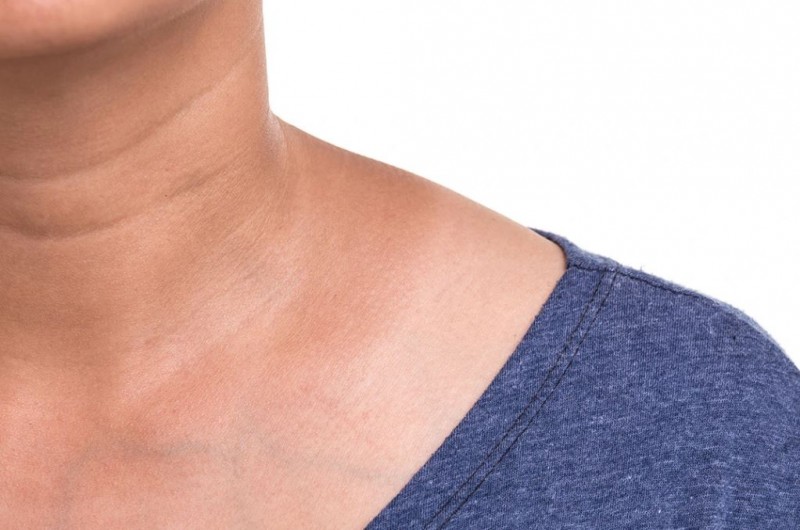
The neck, often overlooked in discussions of health and wellness, can provide valuable insights into one's overall well-being. While it is common for the posterior region of the neck to accumulate dirt, sweat, and pollutants, certain markings such as black lines and creases warrant closer attention due to their potential association with underlying health conditions.
Neck Lines as Health Indicators
Experts suggest that the appearance of the neck can offer valuable clues about an individual's health status. A slender and elongated neck is often associated with good health, reflecting proper weight management and overall fitness levels. Conversely, a short and broad neck may indicate underlying health issues, prompting further investigation.
Types of Neck Lines
Grime and Accumulation: The accumulation of dirt, sweat, and pollutants in the posterior region of the neck is a common occurrence and typically does not signify any underlying health concerns. Regular hygiene practices can effectively address this issue.
Black Lines and Creases: Black lines extending across the front and back of the neck, known as Acanthosis Nigricans, are of particular concern. These velvety lines and creases may signify metabolic disorders such as insulin resistance and diabetes, among other health issues.
Health Risks Associated with Neck Lines
Individuals exhibiting black lines and creases on their necks face an increased risk of various health conditions, including but not limited to:
Diabetes: Acanthosis Nigricans is commonly associated with insulin resistance and type 2 diabetes, making individuals with these markings particularly vulnerable to diabetes-related complications.
Metabolic Disorders: Metabolic disorders characterized by abnormalities in metabolism, such as obesity and dyslipidemia, often manifest through visible markers like neck lines.
Cancer Risk: In some cases, the presence of neck lines may indicate an increased risk of certain cancers, warranting immediate medical attention and further evaluation.
Identifying Individuals at Higher Risk
Medical journals have identified several factors that increase an individual's susceptibility to developing neck lines and associated health risks:
Overweight or Obesity: Excess body weight, particularly abdominal obesity, is strongly correlated with the development of metabolic disorders and related health conditions.
Diabetes: Individuals with diabetes, especially type 2 diabetes, are at an elevated risk of developing Acanthosis Nigricans and other metabolic abnormalities.
Family History: A family history of diabetes, obesity, or other metabolic disorders increases an individual's genetic predisposition to developing similar health conditions.
Metabolic Dysfunction: Conditions characterized by metabolic dysfunction, such as polycystic ovary syndrome (PCOS) and insulin resistance, heighten the risk of developing neck lines and associated health complications.
Managing Neck Lines and Associated Risks
Effective management of neck lines and associated health risks involves adopting a comprehensive approach to health and wellness:
Healthy Lifestyle Practices: Embracing a healthy lifestyle characterized by balanced nutrition, regular physical activity, and adequate sleep is crucial for preventing and managing metabolic disorders and associated markers like neck lines.
Weight Management: Maintaining a healthy weight through a combination of dietary modifications, regular exercise, and behavioral changes can help reduce the risk of metabolic disorders and associated health complications.
Medical Evaluation and Monitoring: Individuals exhibiting neck lines should undergo comprehensive medical evaluations, including assessments of blood sugar levels, lipid profiles, liver function, and other relevant parameters. Regular monitoring and follow-up appointments are essential for tracking progress and adjusting treatment plans as needed.
Professional Guidance: Seeking guidance from healthcare professionals, including physicians, nutritionists, and fitness experts, can provide valuable support and guidance in managing neck lines and associated health risks. Personalized interventions tailored to individual needs and circumstances can enhance treatment outcomes and long-term health.
In conclusion, neck lines serve as valuable indicators of underlying health risks and metabolic abnormalities. While certain markings like grime and accumulation are benign and easily addressed through hygiene practices, black lines and creases may signify more serious health concerns requiring medical attention and intervention. By understanding the significance of neck lines and adopting proactive measures to address associated health risks, individuals can take charge of their well-being and strive towards optimal health and vitality.
Weather is changing suddenly, how to take care of health
Weight not decreasing even after dieting? So try following these tips